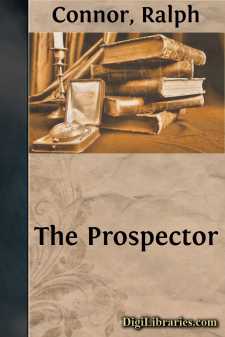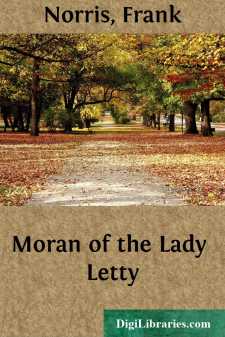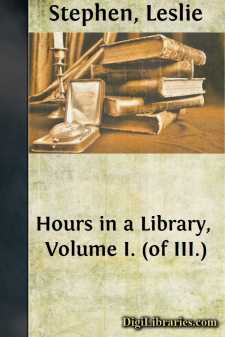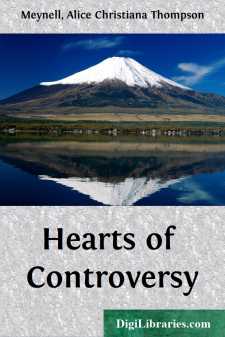Literary Collections
- American 84
- Ancient, Classical & Medieval 14
- Asian 1
- Australian & Oceanian 1
- Canadian 55
- Continental European 121
- English, Irish, Scottish, Welsh 179
- Essays 160
- General 24
- Letters 46
- Middle Eastern 1
Literary Collections Books
Sort by:
"I won't study another word to-day!" Helena tipped the table, spilling the books to the floor. "I want to go out in the sun. Go home, Miss Phelps, that's a dear. Anyhow, it won't do you a bit of good to stay." Miss Phelps, young herself, glanced angrily at her briery charge, longingly at the brilliant blue of sky and bay beyond the long window. "I leave it to Miss...
more...
by:
Ralph Connor
A SOCIAL IMPOSSIBILITY It was one of November's rare days. The kindly air, vital with the breath of the north wind and mellow with the genial sun, was full of purple haze; the grass, still vividly green, gave no hint of the coming winter; the trees, bony and bare but for a few rags of summer dress, russet-brown and gold, stood softened of all their harshness in the purple haze and slanting, yellow...
more...
by:
Charles Lamb
ELIA (From the 1st Edition, 1823) THE SOUTH-SEA HOUSE Reader, in thy passage from the BankвÐâwhere thou hast been receiving thy half-yearly dividends (supposing thou art a lean annuitant like myself)вÐâto the Flower Pot, to secure a place for Dalston, or Shacklewell, or some other thy suburban retreat northerly,вÐâdidst thou never observe a melancholy looking, handsome,...
more...
by:
Frank Norris
I. SHANGHAIED This is to be a story of a battle, at least one murder, and several sudden deaths. For that reason it begins with a pink tea and among the mingled odors of many delicate perfumes and the hale, frank smell of Caroline Testout roses. There had been a great number of debutantes "coming out" that season in San Francisco by means of afternoon teas, pink, lavender, and otherwise. This...
more...
by:
Ralph Connor
The Westminster Company LimitedPublishersToronto Entered according to Act of the Parliament of Canada, in the year one thousand eight hundred and ninety-eight, by The Westminster Company, Limited, at the Department of Agriculture. Have you ever caught the scent of the clover as you were whirled away by the train beyond the city on a summer's day and sped through the rich pasture lands? And do you...
more...
by:
John Campbell
CHAPTER I. The Friends—The Knapsacks—The Queen's Wharf—The Northern Railway—Belle Ewart—The Susan Thomas, Captain and Crew—Musical Performance—The Sly Dog—Misunderstanding—Kempenfeldt Bay. Eugene Coristine and Farquhar Wilkinson were youngish bachelors and fellow members of the Victoria and Albert Literary Society. Thither, on Wednesday evenings, when respectable church-members...
more...
by:
Booth Tarkington
CHAPTER I. A Cat Can Do More than Look at a King It was long ago in the days when men sighed when they fell in love; when people danced by candle and lamp, and did dance, too, instead of solemnly gliding about; in that mellow time so long ago, when the young were romantic and summer was roses and wine, old Carewe brought his lovely daughter home from the convent to wreck the hearts of the youth of...
more...
by:
John Galsworthy
QUALITY I knew him from the days of my extreme youth, because he made my father's boots; inhabiting with his elder brother two little shops let into one, in a small by-street-now no more, but then most fashionably placed in the West End. That tenement had a certain quiet distinction; there was no sign upon its face that he made for any of the Royal Family—merely his own German name of Gessler...
more...
by:
Leslie Stephen
OPINIONS OF AUTHORS Libraries are as the shrines where all the relics of the ancient saints, full of true virtue, and that without delusion or imposture, are preserved and reposed.—Bacon, Advancement of Learning. We visit at the shrine, drink in some measure of the inspiration, and cannot easily breathe in other air less pure, accustomed to immortal fruits.—Hazlitt's Plain Speaker. What a...
more...
SOME THOUGHTS OF A READER OF TENNYSON Fifty years after Tennyson’s birth he was saluted a great poet by that unanimous acclamation which includes mere clamour. Fifty further years, and his centenary was marked by a new detraction. It is sometimes difficult to distinguish the obscure but not unmajestic law of change from the sorry custom of reaction. Change hastes not and rests not, reaction...
more...











